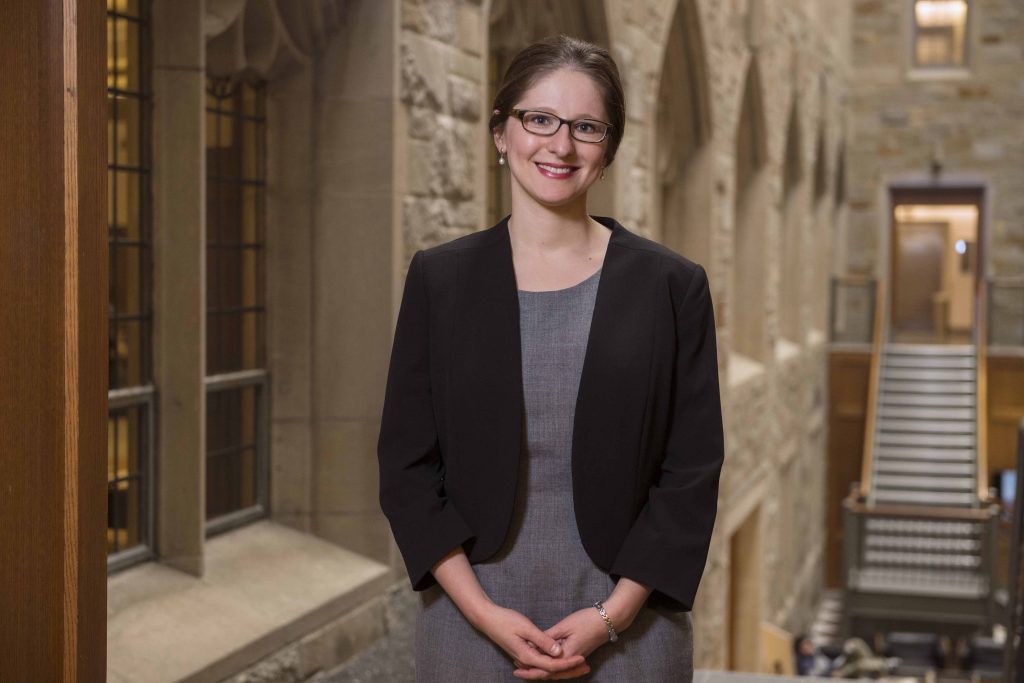BC Law Professor Natalya Shnitser was instrumental in launching the Spring 2022 Retirement Research Seminar Series, an interdisciplinary initiative between Boston College Law School and the Boston College Center for Retirement Research (CRR).
The four-part series is engaging scholars from BC and across the country: Taha Choukhmane, assistant professor of finance at MIT; Joanna Lahey, associate professor of public service and administration at Texas A&M University; Jean-Pierre Aubry, director of state and local research at CRR; and Dana Muir, Robert L. Dixon Collegiate Professor of Business at the University of Michigan.
The topics being addressed are representative not only of the significance and complexities of retirement research but also its variety and interconnectedness. Choukhmane looked at how married couples save for retirement and at racial disparities in retirement saving. Lahey focused on age and the labor market for Hispanics in the US. At the two upcoming events, Aubry will speak May 18 about how to improve private sector retirement savings. On May 25, Muir will assess the role of pension funds in society. Events are 3-5 p.m. at the Hovey House Library.
BC Law Magazine interviewed Professor Shnitser, a scholar focused on retirement security, retirement and health care benefits, multiple-employer plans, and the regulation of financial intermediaries, to find out more about the importance of the series and of the study of retirement itself.
What inspired the creation of the Retirement Research Seminar Series?
Boston College is quite unique in that it has experts across the University studying retirement security from a variety of perspectives and methodologies. Through this workshop series, we aim to foster opportunities for scholars across the University and beyond to engage with, learn from, and build on each other’s work.
What major takeaways do you foresee this interdisciplinary series having on your scholarship and work here at BC Law?
Although my work focuses on the role of legal institutions and regulatory frameworks in US retirement policy, it is informed by the empirical work and data in the field, including extensive datasets that scholars at the Center for Retirement Research have assembled over the years. Reading and engaging with scholarship from other disciplines is vital for understanding the policy debates and assessing how legal scholars can best contribute to the national conversation on retirement reform. I look forward to learning from each of the seminar speakers, exploring opportunities for collaboration, and creating a space for interdisciplinary conversations on topics of shared interest.
What role can BC Law play in these developing national conversations on retirement research?
This is a really exciting time for retirement research. There’s a growing recognition that the law that governs employee benefits, which was enacted nearly five decades ago, has not kept pace with economic and demographic changes, including changes to the nature of work and the allocation of risk between employers and workers in the United States. While momentum has been building for federal reform, in recent years states have taken the lead in experimenting with new strategies for promoting retirement security for workers in their states. With such momentum for reform and experimentation across jurisdictions, it is vitally important that scholars study and evaluate the enacted and proposed changes, and glean lessons for more comprehensive reform in the years ahead. Many such reforms include complex questions of law and policy, and BC Law is well positioned to offer interdisciplinary insights and scholarly analyses of potential paths forward.
How does the field of employee benefits touch on and differ from other legal fields?
Employee benefits law draws on and intersects with several areas of law, including most notably tax, employment, trusts and estates, family law, and corporate law. For example, the US retirement system is driven in large part by tax incentives. Employee benefits, including access to employer-sponsored health insurance and retirement plans, are a fundamental element of the employment relationship in the United States. The regulatory regime for employee benefits draws heavily on the law of trusts, and a significant portion of intergenerational wealth today is transferred through retirement plans. Such plans also pose unique challenges in family law matters such as divorce, and in corporate matters such as mergers and acquisitions. Working and doing research in the field of employee benefits is exciting in part because it affords one the opportunity to interact with practitioners and scholars across numerous other fields.
What ramifications has the pandemic had on the ways that retirement plans and other forms of employee benefits are distributed and received?
The pandemic has certainly underscored the extent to which retirement and health care benefits are tethered to employment in the United States, the critical role that employers play as financial intermediaries for workers, and the variation in access to and quality of benefits across different employers. The pandemic and subsequent economic volatility have heightened the urgency of studying how to help workers in the United States increase emergency savings, including possibly through the existing retirement vehicles. Scholars are actively studying all of these issues, a number of which will be covered in the upcoming Retirement Research Series.
Interview conducted by Sam Bader


